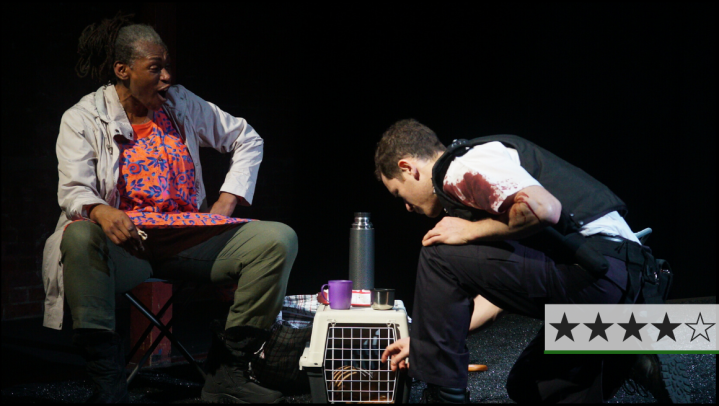
‘Can I Help You?’, by the late playwright Philip Osment, is as equally fascinating as it is strange. It is set on the edge of a cliff where a policeman, Francis (Gabriel Vick), encounters an old Ghanaian woman, Fifi (Susan Aderin). The piece explores a range of themes including childhood trauma, suicide, grief and treatment of mental health conditions in society. Although Francis and Fifi are like chalk and cheese, we see that in having each other for company, they are indirectly able to help one another.
In the opening scene, Francis is standing dangerously close to the edge of a cliff, when Fifi first encounters him. Fifi, reminds me of one of my Ghanian aunties; she is a larger than life, inquisitive lady who wears mismatched layers of clothes. As Fifi realises that Francis may be contemplating suicide, she interprets this as a sign from God to stay by his side. She’s come prepared with camping chairs, a flask of tea, biscuits and cold jollof rice in a tupperware. Although Francis is initially hostile and threatens to arrest her (no surprise there), he eventually gives in and opens up. This is where things take an interesting turn.
It’s compelling to see some of the differences between the unusual pair play out as they discuss subjects such as violence, immigration and adulthood. We see that as a policeman, Francis has become desensitised to the killings he has witnessed between youths; he describes how the blood on his shirt is from a teenager he saw die earlier that night. On the other hand, Fifi is a deeply empathetic woman of God and seeks to challenge why Francis carries so much hate in his heart. Although Francis and Fifi don’t appear to have a whole lot in common, neither of them leave each other’s side.
With this piece, I was most struck by the way it shows that the things which we learn about someone is often just the tip of the iceberg. The show slips and slides out of their present lives and into some their memories from the past which are submerged under the surface. We see how their respective cultures, upbringings and family relationships have driven the behaviours that we see at the fore. These transitions in time feel seamless thanks to the direction by Jim Pope and lightning design by Ian Scott. As more is revealed about their past through a series of flashbacks, we see their own experiences of trauma and how this has shaped who they are. Interestingly, it turns out they are not too dissimilar after all.
Particularly intriguing is the depiction of Fifi as a woman suffering from psychosis and the differences in treatment she received in Ghana compared to the UK. Fifi explains how those around her in Ghana forcefully believed that she was cursed and needed to drive out the devil and repent from her sins. But just as Fifi criticises the treatment she received there, she is also cynical of the treatment provided in the UK. She explains how medical professionals would also see her as something to be fixed and force her to take disorientating pills to address the supposed chemical imbalance in her brain. But all she wants is for someone to listen to her.
The play works in large part due to the brilliant performances by Susan Aderin and Gabriel Vick, who both have the difficult task of portraying their main roles and also the supporting characters in the various flashbacks.
Can I Help You?’ is an unconventional piece which weaves in some interesting commentary on wider society. Here the policeman, known for helping others, is in need of rescuing. But he isn’t rescued by hugs and kind words but by a deeply troubled woman who doesn’t leave him alone and doesn’t shy away from challenging him. It demonstrates how a conversation with a stranger can go a long way and that we’re capable of helping one another more than we realise.
‘Can I Help You?’ is running at the Omnibus Theatre until 21 March 2020 at the time of writing.
http://www.omnibus-clapham.org/can-i-help-you/
Photo Credit: Bridie O’Sullivan
